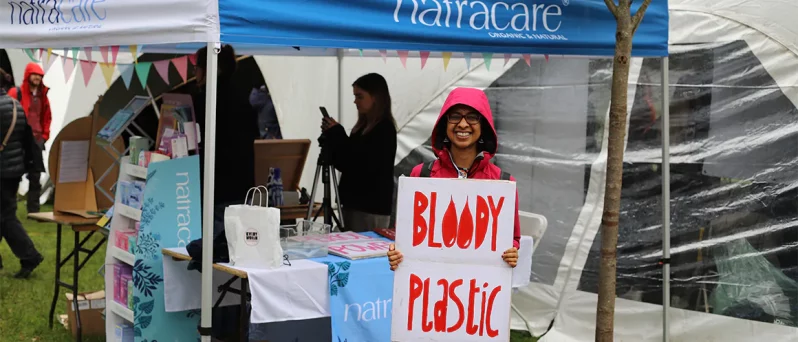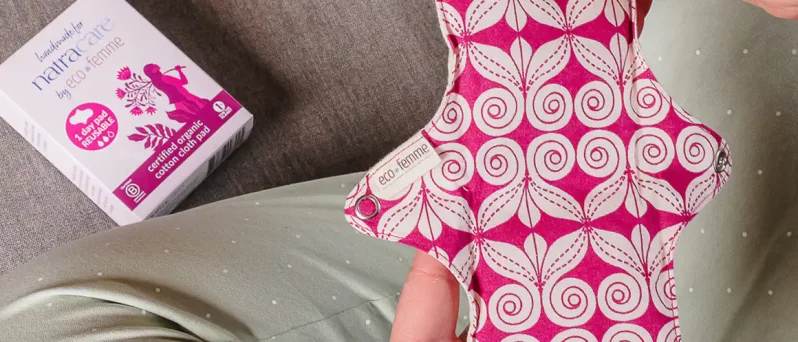A report published on the 21st October1 shows consumers are being misled by greenwashing claims made by the menstrual product industry.
Research published by Greenpeace Laboratories2, has found that tampon applicators sold as ‘plant-based plastic’ are in fact polyethylene. This has the same material that plastic bottles, toothbrushes and normal oil-based tampon applicators are made from.
Tampon applicators sold by eight brands were tested. Five were marketed as ordinary (oil-based) plastic and three were marketed as ‘plant-based’ plastic. All eight applicators were polyethylene at the end result.
This greenwashing comes as no surprise – big, profit-driven businesses are learning to exploit consumers’ growing eco-consciousness to compete in a changing market. Green-minded consumers see the words ‘plant based’ and think that they are choosing an eco-friendly alternative to oil-based plastic. ‘Plant-based’ suggests that these applicators are biodegradable, compostable, and therefore guilt-free.
However, if a plastic is labelled ‘plant based’, it isn’t necessarily a compostable or biodegradable plastic. It just means that a proportion of its ingredients has come from plants – for example, sugar cane. As little as 20% of the total ingredients can come from plants for a plastic to be labelled as ‘plant-based’.3
Five of the eight brands selling tampons with plastic applicators were organic. While tampons made from organic cotton are certainly better for the environment, in terms of the reduction of pesticide use and improved soil health, organic standards are designed to uphold the organic principles of health, ecology, fairness and care.4 The sale of environmentally-polluting plastic applicators for use with organic tampons is in contrary to these principles.
Outside of the organic industry, ordinary plastic tampon applicators have been sold with non-organic tampons since 1973, and continue to contribute to large-scale plastic pollution.5 On average, 11,000 menstrual products will be used in a lifetime.6 Each plastic applicator sold with a tampon is thrown away after only a few seconds of functional use. Research conducted by the Women’s Environmental Network showed that there were nine plastic applicators for every kilometre of beach in the UK.7 In fact, menstrual products are the fifth most common item containing plastic that you’ll find on European coastlines.8
It’s worth noting that compostable and biodegradable plastics do exist, and they do decompose in the right environments – such as in industrial or home composting systems. But in order for this technology to be useful, it needs to be clearly defined, labelled and understood.
Susie Hewson is the founder of Natracare. She developed the world’s first ever organic, plastic-free tampon in 1989, in response to a lack of healthy options for managing menstruation. Natracare’s period products were introduced to the market at a time when period products were composed largely of synthetic materials.
When asked about greenwashing, Susie said: “It’s such a shame that during a time when we need to band together to make changes that help the environment, cynical, profit-driven businesses are exploiting people’s will to do the right thing.”
She continued: “If something isn’t broken, don’t fix it. Where is the need for a plastic tampon applicator, if cardboard applicators work fine and don’t leave a lasting mark on the planet? Natracare’s tampon applicators have always been made from cardboard – and always will be. That’s because we designed our products with the environment in mind. Not because it’s profitable or fashionable, but because it’s the right and only thing to do.”
Dr. David Santillo from the Greenpeace Research Laboratories, who undertook the research, said: “Whether they were made from oil or from plant-based feedstock, the tampon applicators we tested were still the same old plastic. Polyethylene made from plant-derived carbon is still polyethylene, meaning that the applicators in the organic-labelled products we analysed will likely persist in the natural environment in exactly the same way as ‘conventional’ plastic applicators. The fact that consumers are being sold these products as a positive environmental choice is misleading and must be addressed.”
Since 2017, Natracare has been working alongside the Global Organic Textile Standard (GOTS) to close the loophole which allows for environmentally damaging single-use plastics to be certified along with organic tampons. GOTS is currently reviewing the standard. Natracare has pledged to remain vigilant until the standard is changed.
References
- Natracare, 2019 – Applicators Unwrapped – the Truth About Plant-Based Plastic Tampon Applicators [PDF]
- Dr. David Santillo, Greenpeace Research Laboratories – Identification of polymer type used for a selection of tampon applicators and their packaging on sale in the UK, and screening of applicators for chemical additives and contaminants:
- Renee Cho, Earth Institute, Columbia University, 2017 – The Truth about Bioplastics.
- Soil Association – What is Organic?
- Alejandra Borunda, National Geographic – How tampons and pads became so unsustainable
- Women’s Environmental Network – Environmenstrual in Numbers
- Women’s Environmental Network – Periods are natural. Bleached plastic sanitary products aren’t (This figure was true in 2010 and is bound to have increased exponentially, since plastic doesn’t disappear – it only accumulates in the environment)
- European Parliament News, 2021 – Plastic in the ocean: the facts, effects and new EU rules
Notes to editors
Natracare is the first company in the world to provide plastic-free, certified organic cotton tampons and totally chlorine-free sanitary pads and panty liners. Natracare products are biodegradable and can even be composted. Susie Hewson created the brand in 1989 in response to the growing danger to human health and the environment from dioxin pollution in the pulping industries with the chlorine bleaching of paper products.
Greenpeace Laboratories undertook the research, It was split into two parts – the first set of data was published in August 2018 and the second was undertaken in August 2019 but published today (21st October 2019). Of the 8 brands tested, 5 were organic and 3 were non-organic brands. The three brands tested which sell ‘plant-based’ applicators are Seventh Generation, Organyc and O.B. These brands are available worldwide through online retailers. Tampax also sell organic-core tampons with ‘plant-based’ applicators, in their Tampax Pure range.
Greenpeace Laboratories is different and separate from Greenpeace UK (the charity), and needs to be distinguished as such.








